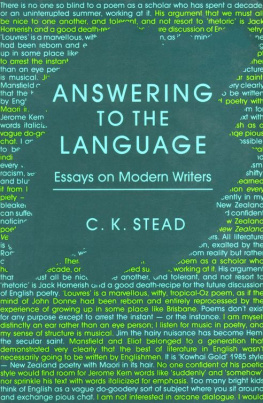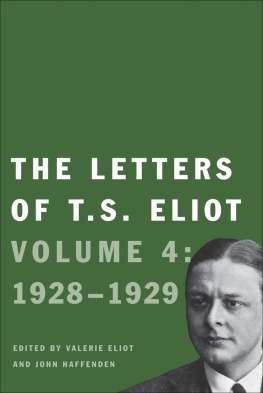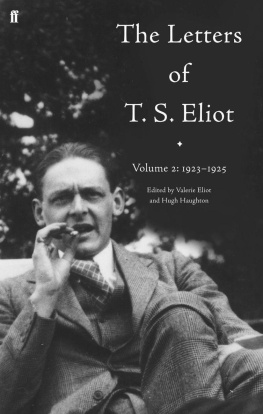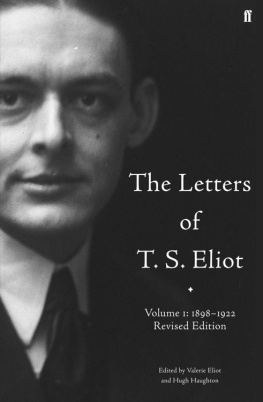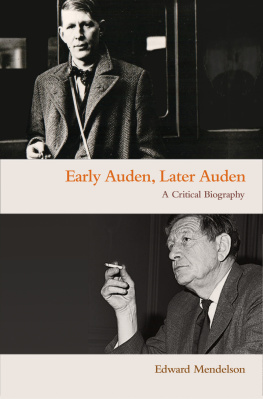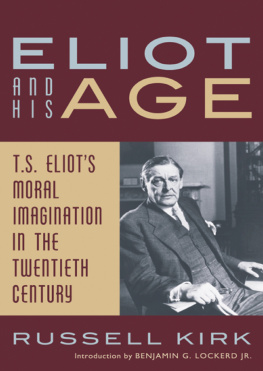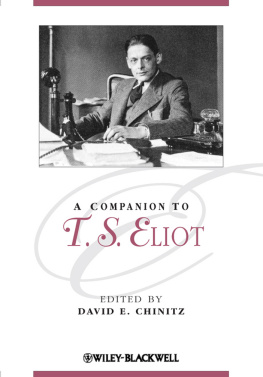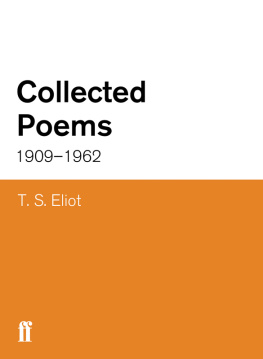When the Eternal Can Be Met
The Bergsonian Theology of Time in the Works of C. S. Lewis, T. S. Eliot, and W. H. Auden
Copyright 2014 Corey Latta. All rights reserved. Except for brief quotations in critical publications or reviews, no part of this book may be reproduced in any manner without prior written permission from the publisher. Write: Permissions, Wipf and Stock Publishers, W. th Ave., Suite , Eugene, OR 97401 .
Pickwick Publications
An Imprint of Wipf and Stock Publishers
W. th Ave., Suite
Eugene, OR 97401
www.wipfandstock.com
isbn : 978-1-62564-421-3
eisbn : 978-1-63087-259-5
Cataloguing-in-Publication data:
Latta, Corey.
When the Eternal can be met : the Bergsonian theology of time in the works of C. S. Lewis, T. S. Eliot, and W. H. Auden / Corey Latta.
viii + pp. ; cm. Includes bibliographical references.
isbn : 978-1-62564-421-3
Bergson, Henri, 18591941. 2. Lewis, C. S. (Clive Staples), 18981963 Criticism and interpretation. Eliot, T. S. (Thomas Stearns), 18881965 Criticism and interpretation.. Auden, W. H. (Wystan Hugh), 19071973 Criticism and interpretation. 5. Time. I. Title.
B2430.B43 L188 2014
Manufactured in the U.S.A.
The time has passed when time doesnt count.
Paul Valry, La Crise de lesprit (1919)
Humans live in time... therefore... attend chiefly to two things, to eternity itself and to... the Present. For the Present is the point at which time touches eternity... in it alone freedom and actuality are offered.
C. S. Lewis, The Screwtape Letters (1942)
Introduction
B roadly, this book is about philosophical influence on theological articulations. Specifically, I claim that C. S. Lewis, T. S. Eliot, and W. H. Audens post-conversion works that have time as a theological theme cannot be completely understood apart from the philosophy of Henri Bergson. Until now there have only been four books devoted exclusively to the relationship between the philosophy of Henri Bergson and twentieth-century literature. Both Paul Douglass in Bergson, Eliot, and American Literature ( 1986 ) and Tom Quirk in Bergson and American Culture ( 1990 ) examine Bergsons influence on Anglo-American writers. While Shiv Kumars Bergson and the Stream-of-Consciousness Novel ( 1963 ) looks at Bergsons impact on James Joyce and Virginia Woolf, its scope is narrowed to only include a few of Bergsons ideas and their influence on a select group of authors. The most exhaustive study of Bergson, twentieth-century authors, and literary modernism is Mary Ann Gilliess Henri Bergson and British Modernism ( 1996 ). In Gillies treatment of Bergsons influence on twentieth-century literature, she focuses on authors such as Conrad, Joyce, Woolf, Richardson, and Eliot. Other works like Michael Levensons A Genealogy of Modernism ( 1984 ) and Sanford Schwartzs Matrix of Modernism: Pound, Eliot and Early Twentieth Century Thought ( 1985 ) have devoted chapters and essays to Bergsons relationship to modernism, twentieth-century currents of thought, and twentieth-century literature. This present work makes only the fifth major attempt to investigate Bergsons influence on twentieth-century literature and the first attempt to examine Bergsons influence on the Christian theology of twentieth-century authors C. S. Lewis, T. S. Eliot, and W. H. Auden.
Bergson was a major philosophical force in the first two decades of the twentieth century, and by the time Lewis, Eliot, and Auden wrote their post-conversion works Bergsons ideas were widely known by twentieth-century philosophers, theologians, and writers. Because of Bergsons influence it is surprising that there is such a scarcity of scholarship on Bergson and the theological literature of important twentieth-century authors. Thus, I seek to fill the holes, while creating some new craters, in scholarship on early- to mid-twentieth century theologized literature and Bergsons influence on important twentieth-century writers by demonstrating a strong dependence on Bergsons ideas by Lewis, Eliot, and Auden.
C. S. Lewiss The Great Divorce , T. S. Eliots Four Quartets , and W. H. Audens Kairos and Logos are theological treatments of time that rely on Bergsons theory of time, and particularly on his concept of duration . Indeed, without Bergson, Lewis, Eliot, and Auden could not have composed their works, as we now know them and could not have articulated what I will refer to as their theologies of time. There are three reasons why I think the Bergson connection to these twentieth-century Christian writers is important and contributory to studies of Lewis, Eliot, and Auden, as well as to the field of theology and literature. First, one cannot understand the theological agendas in these authors works without an understanding of Bergsonian duration. Second, not only was Christian theology of the utmost personal importance to each author, but also the promulgation of theology was the controlling idea behind their post-conversion works on time.
Yet another reason is that scholars have missed the theological connections between the three authors. While Lewis, Eliot, and Auden enjoyed successful contemporaneous careers and while they all converted to Christianity roughly within a decade of one another, scholars have failed to see any strong theological connections among them. The fact is that Lewis, Eliot, and Auden share a remarkable theological and thematic relationship that once revealed will situate each writer in a group of authors that shared the common goal of theologizing the theme of time for a twentieth-century audience. Scholarship has created a gulf between these authors, in that Eliot and Auden have been depicted as icons of literary modernism, while Lewis has traditionally been cast as an apologist and creator of the fantastic. This divergent reading of these three authors needs to be altered to accommodate their important theological commonalities.
In the area of theology, Eliot and Auden were every bit as interested in promulgating Christianity as Lewis. In fact, like Lewis, whose career is known for popularizing theology to his fellow twentieth-century readers, Eliot and Auden took on the roles of what I will here describe as literary theologians. And the theme of time reveals a theological interest deemed immensely important by each author. Establishing this theological and thematic connection among the authors is thus important for understanding their individual post-conversion careers. It is also a significant thread in their theological constructions that Lewis, Eliot, and Auden all composed Bergsonian works on time. Without a Bergsonian reading, which has yet to be applied to the works studied here, one misses a controlling idea behind their post-conversion works. Lewis, Eliot, and Auden did not choose to write biblically allegorical treatments of time, in the vein of Bunyans Pilgrims Progress ( 1678 ) or like Hannah Hurnards Hinds Feet on High Places ( 1955 ), nor did they mostly rely on a prominent theologian from centuries past or a distinctly religious thinker from their own. Instead, each author looked to and was influenced by the philosophy of twentieth-century philosopher Henri Bergson.


